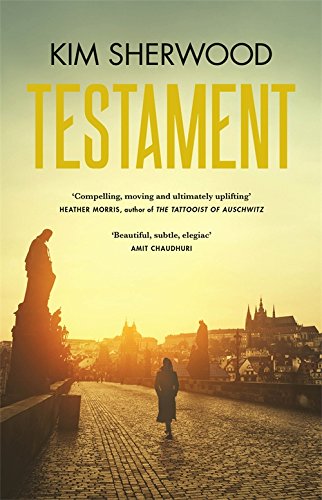Why a Booktrail?
A novel of a young woman uncovering the truth about her family’s past in the Hungarian Holocaust.

A novel of a young woman uncovering the truth about her family’s past in the Hungarian Holocaust.
Of everyone in her complicated family, Eva was closest to her grandfather: a charismatic painter – and a keeper of secrets. So when he dies, she’s hit by a greater loss – of the questions he never answered, and the past he never shared.
It’s then she finds the letter from the Jewish Museum in Berlin. They have uncovered the testimony he gave after his forced labour service in Hungary, which took him to the death camps and then to England as a refugee. This is how he survived.
But there is a deeper story that Eva will unravel – of how her grandfather learnt to live afterwards. As she confronts the lies that have haunted her family, their identity shifts and her own takes shape. The testament is in her hands.
The Prague Jewish Museum is made up of five synagogues and Europe’s oldest Jewish graveyard, which together tell the story of Jewish life in the Czech Republic. Pinkas Synagogue stands as a memorial to victims of the Nazis, with 77,297 names painted on its walls. A line from Lamentations marks the entrance: ‘Let it not come unto you, all ye that pass by! Behold, and see if there by any pain like unto my pain…’ For me, this evokes what art can do, inviting us to empathically step inside the pain of another.
Though Jewish Prague is most visible in Staré Mesto, the suburb of Vinohrady with its pastel Art Nouveau apartment blocks has its own Jewish story. Vinohrady was home to the largest Jewish community in interwar Czechoslavakia, and one of the biggest synagogues in the world. This is where Zuzka grew up, her family apartment overlooking Grébovka Park, where she climbed amongst the vines and played in the grottoes.
The Nazis turned the town into a ghetto and concentration camp, through which 150,000 people passed on their way to the death camps. Zuzka escapes deportation to Auschwitz here, but loses both her mother and uncle.
Three hundred orphans gathered in the Old Town Square to take a photograph in front of the Jan Hus statue, which would be published in international newspapers in the hopes that family members might recognise their children. Zuzka is part of the photograph. Around the base of the statue runs the line: ‘Live, nation sacred to God, do not die. Love one another, do not deny the truth to anyone’.
While a lot of my site-based research involves walking in the footsteps of my characters, I also learn about their culture more widely. If you’re going to Prague, I’d recommend the Holešovice suburb, where a DIY arts and crafts culture is reviving an impoverished neighbourhood. I learnt here about Prague culture old and new, discovering artists like Jakub Schikaneder, who showed me Zuzka’s loneliness, in the Veletržni Palác gallery.
As I create my characters, I seek out aspects of their childhoods, and I went to Divoká Šárka nature park in Zuzka’s footsteps. It’s hard to move in Prague for the swell of tourists, and if you are trying to experience life outside of the tourist trade – and to escape the sweltering heat – I’d recommend walking through the rocky forest to the almost hidden Šarka pool, where you will most likely be the only native English speaker. Here you can spend the day swimming against the backdrop of the mountains. There are worse places to write.
Destination : Prague Author/Guide: Kim Sherwood Departure Time: 1940s
Back to Results1910. 1970s :In the middle of a severe storm two sisters rescue a mysterious man from a shipwreck.
Read more